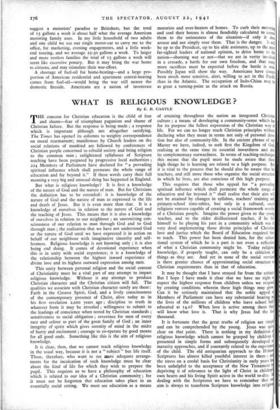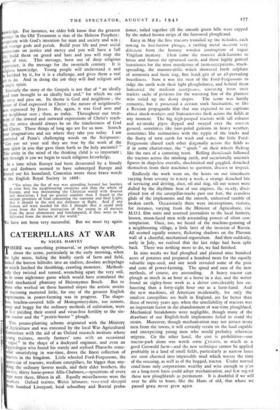WHAT IS RELIGIOUS KNOWLEDGE ?
By E. B. CASTLE THE concern for Christian education is the child of fear and shame—fear of triumphant paganism and shame of Christian failure. But the response is being made ; a response which is important although not altogether satisfying. The Times has opened its columns to weighty correspondence on moral rearmament; manifestoes by Church leaders on the social relations of mankind are followed by conferences of Christian people concerned to rebuild society and bring religion to the common man ; enlightened syllabuses of Scripture teaching have been prepared by progressive local authorities ; 224 Members of Parliament have declared for " a pervading spiritual influence which shall permeate the whole range of education and far beyond it." If these words carry their full meaning a very big and unusual thing has happened in England.
But what is religious knowledge? It is first a knowledge of the nature of God and the nature of man. But for Christians the definition has to be extended: it is knowledge• of the nature of God and the nature of man as expressed in the life and death of Jesus. But it is even more than that. It is a knowledge of ourselves in relation to the nature of God and the teaching of Jesus. This means that it is also a knowledge of ourselves in relation to our neighbour ; an unremitting con- sciousness of our relation to man through God and to God through man ; the realisation that we have not understood. God or the nature of God until we have expressed it in action on behalf of our neighbour with imaginative sincerity and self- lessness. Religious knowledge is not knowing only ; it is also being and doing. It comes of devotional experience when this is in unity with social experience; it is a knowledge of the relationship between the highest inward experience of divine love and its highest outward expression among men.
This unity between personal religion and the social content of Christianity must be a vital part of any attempt to impart religious knowledge. Without it any attempt to produce Christian character and the Christian citizen will fail. The qualities we associate with Christian character surely are these: Faith in the Creator Spirit, God, and a lively consciousness of the contemporary presence of Christ, alive today as in his first revelation 2,000 years ago ; discipline to truth in whatever form it may be revealed ; willingness to submit to the leadings of conscience when tested by Christian standards ; sensitiveness to social obligation ; reverence for men of every race and colour as part of the great family of God ; an inner integrity of spirit which gives serenity of mind in the midst of hurry and excitement ; courage to co-operate by good means for all good ends. Something like this is the aim of religious knowledge.
It is clear, then, that we cannot teach religious knowledge in the usual way, because it is not a " subject " but life itself. Those, therefore, who want to see more adequate arrange- ments for the inculcation of such knowledge must be clear about the kind of life for which they wish to prepare the pupil. This requires us to have a philosophy of education which is related to our idea of a Christian community ; for it must not be forgotten that education takes place in an essentially social setting. We must see education as a means of attaining throughout the nation an integrated Christian culture ; a means of developing a community-sense which has for its purpose the fullest expression of the Christian way of life. For we can no longer teach Christian principles without declaring what they mean in terms not only of personal dens don but also of community-life. In the ancient phrase of our Master we have, indeed, to seek first the Kingdom of God, realising at the same time its essential inwardness and also its complementary outwardness. In terms of teaching-technique this means that the pupil must be made aware that these high things he is learning are related to a high purpose. But it is vital to the process that he should also be aware that his teachers, and still more those who organise the social structure in which he lives, are also conscious of this high purpose.
This requires that those who appeal for " a pervading spiritual influence which shall permeate the whole range of education and far beyond it " shall realise that their aim will not be attained by changes in syllabus, teachers' training and primary-school time-tables, but only in a cultural, social religious venture capable of creating a social framework worthy of a Christian people. Imagine the power given to the young teacher, and to the older disillusioned teacher, if he felt himself to be playing his part in a community which was in very deed implementing those divine principles of Christian love and justice which the Board of Education required him to teach. This power has been denied him, for the educa- tional system of which he is a part is not even a reflection of what a Christian community might be. Today religious knowledge, if properly taught, can only be a criticism d things as they are. And yet in none of the social services is there greater chance of approximating social structure to Christian requirements than in that of education.
It may be thought that I have strayed far from the subject But I hope I have made it clear that we have no right to expect the highest response from children unless we respond by creating conditions wherein these high things may grow. Can it be seriously maintained that the noble appeal of Members of Parliament can have any substantial bearing 00 the lives of the millions of children who leave school half educated at 14.o? When love is active among them they will know what love is. That is why Jesus fed the five thousand.
It is fortunate that the great truths of religion are simple and can be comprehended by the young. Jesus was quilt clear on that point. There is nothing in my 'definition religious knowledge which cannot be grasped by children if presented in simple forms and subsequently developed as maturity approaches, and if constantly related 'to the experien of the child. The old antiquarian approach to the Hebr Scriptures has almost killed youthful interest in them ; the stress on a credal basis for Christianity in early years been unhelpful to the acceptance of the New Testament by depriving it of relevance to the light of Christ in children's own hearts and his living Spirit active in the world to-day. II dealing with the Scriptures we have to remember that nor aim is always to transform Scripture knowledge into religi owledge. For instance, we older folk know that the greatest essage in the Old Testament is that of the Hebrew Prophets: perate with God's intention for man and society and win ; ek strange gods and perish. Build your life and your social sututions on justice and mercy and you will have a full e; build them on greed and hate and you will reap the nits of vice. This message, born out of deep religious .perience, is the message for the twentieth century. It is ligious knowledge. Young people will understand it and fortified by it, for it is a challenge, and gives them a real b to do. And in doing the job they will find religion and single spirit.
similarly the story of the Gospels is not that of " an ideally ood man brought to an ideally bad end," for which we can e sorry and pass on. Its theme is God and neighbour ; the cure of God expressed in Christ ; the nature of neighbourli- ess expressed by Jesus. But, again, it was God now and ur neighbour now ; then, as today. Throughout our treat- ent of the inward and outward expressions of Christ's teach- g, the stress should always be on the timelessness of God nd Christ. These things of long ago are for us now. Stretch our imaginations and see where they take you today. I am minded of Penn's challenging words on the Scriptures: Can you set your seal they are true by the work of the me spirit in you that gave them forth to the holy ancients? " his unity in the mind of the thinking child is so important ; nly through it can we begin to teach religious knowledge.
At a time when Europe had been devastated by a bloody ar and darkness seemed to have submerged Europe and lotted out his homeland, Comenius wrote these brave words o the English Royal Society in 1668: " Yet when the fire of war was spreading beyond her borders to seize first the neighbouring countries and then the whole of Europe, and was threatening the Christian world with disaster and desolation, I had no greater comfort than I found in the ancient promises of God concerning the supreme and final Light, that it should in the end put darkness to flight. And if any human aid were needed for this I thought that it could only come from the better instruction of the young in all matters from the most elementary and fundamental, if they were to be delivered from the mazes of the world."
e have not been very successful. But we must try again.



























 Previous page
Previous page